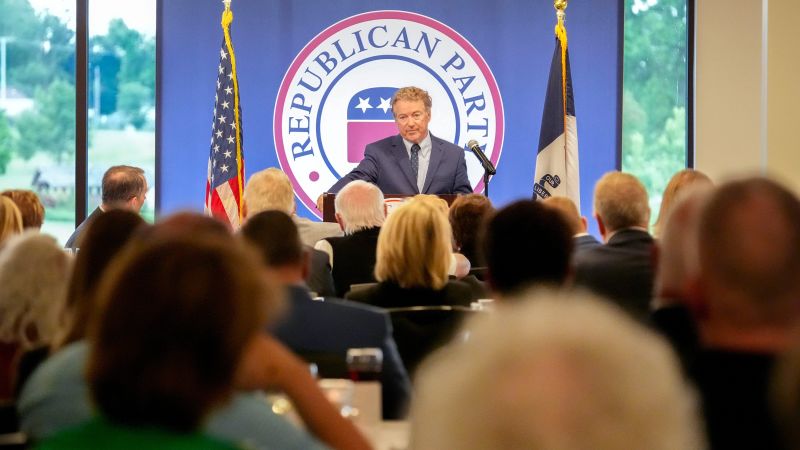In recent political events, Kentucky Senator Rand Paul and Florida Senator Rick Scott engaged directly with Republican voters during fundraising campaigns in Iowa, as they began to address the impending presidential nomination race for 2028. Their presence in Iowa was significant, given that the state plays a crucial role at the beginning of the presidential electoral process for the Republican Party. The senators made their intentions to advocate for a thoughtful approach towards President Donald Trump’s ambitious legislative agenda clear, emphasizing the necessity of holding back on the extensive proposals, dubbed the “big, beautiful” bill.
Among the Iowans present at the events was Sue Cheek, a resident of Eldridge, who expressed staunch support for Trump’s agenda. Cheek firmly stated, “We are the ones that elected Trump. This is what we wanted him to do. So let him do it.” This sentiment underscores a broader expectation among many Trump supporters who want the president’s policies enacted without delay. Cheek’s insistence reflects a critical viewpoint that sees the urgency of securing the nation’s interests above all, with the belief that costs associated with security measures are secondary to achieving that primary goal.
Trump’s tenure, although still in its early stages, has already inspired a wave of candidate prospects who are looking to position themselves favorably in the eyes of the Republican base that thrust Trump into the presidential spotlight. In their visits to Iowa, Paul and Scott found themselves amidst a landscape where Trump’s influence remains strong, especially among party loyalists. While Paul has made it clear that his legislative agenda is seeking substantial fiscal adjustments, including opposition to raising the debt ceiling and advocating for significant spending cuts, Scott places his focus on prioritizing elements of Trump’s policies, such as making the tax cuts established in 2017 permanent and securing the southern border against illegal crossings.
In navigating these discussions, both senators are confronted with a divided Republican base. Many supporters place immense value on rapid advancement of Trump’s priorities, while Paul has acknowledged receiving feedback from party members advocating for a quicker push in Congress to adopt these policies. “Some people come up to me and some people genuinely say, ‘Support the president. Support the president,’” Paul remarked. However, he also underscored his role as an independent voice, suggesting that healthy debate within the party is essential for crafting effective legislation.
Scott, although eager to align with Trump’s goals, has also noted a crucial aspect of fiscal responsibility, arguing for a disciplined approach to spending and calling attention to the looming debt issue. The balancing act that these senators must perform illustrates the complexities faced by Republicans as they attempt to maintain harmony among their constituents while navigating the logistical challenges posed by ambitious legislative goals.
Despite the immediate focus on Trump’s agenda, the political scene in Iowa serves as an early battleground for potential candidates who are contemplating their presidential bids. Voter engagement in Iowa remains high, and upcoming local races provide candidates with opportunities to connect with constituents, garnering support ahead of the official nomination processes. Republican Party chairman Jeff Kaufmann has noted that he is already receiving inquiries from candidates seeking guidance on how to approach Iowan voters effectively.
While the 2028 election may seem distant, the early maneuverings underscore the intrigue and unpredictability involved in the electoral process. Kaufmann expressed that candidates who can articulate their positions clearly within a conservative framework will likely receive an honest appraisal from the Iowan electorate. Paul’s willingness to challenge aspects of Trump’s policy was met with subdued applause from local party members, indicating a nuanced tolerance for debate.
Furthermore, local Republicans have expressed frustration over external factors — primarily perceived interference from the judiciary and the media — that they feel obstruct Trump’s ability to govern effectively. As voiced by Tim Striley, chairman of the Clinton County GOP, satisfaction with the intra-party debate is prevalent, yet there are collective concerns about the delays caused by varying levels of resistance to Trump’s initiatives.
Overall, these recent events in Iowa reveal the dynamic and often contentious landscape of the Republican Party as it braces for the future political contests. While opinions diverge on the approach to Trump’s agenda, the conversations initiated by Paul and Scott illustrate the ongoing struggle within the party to balance visionary ambitions against the realities of political negotiations and voter expectations.



